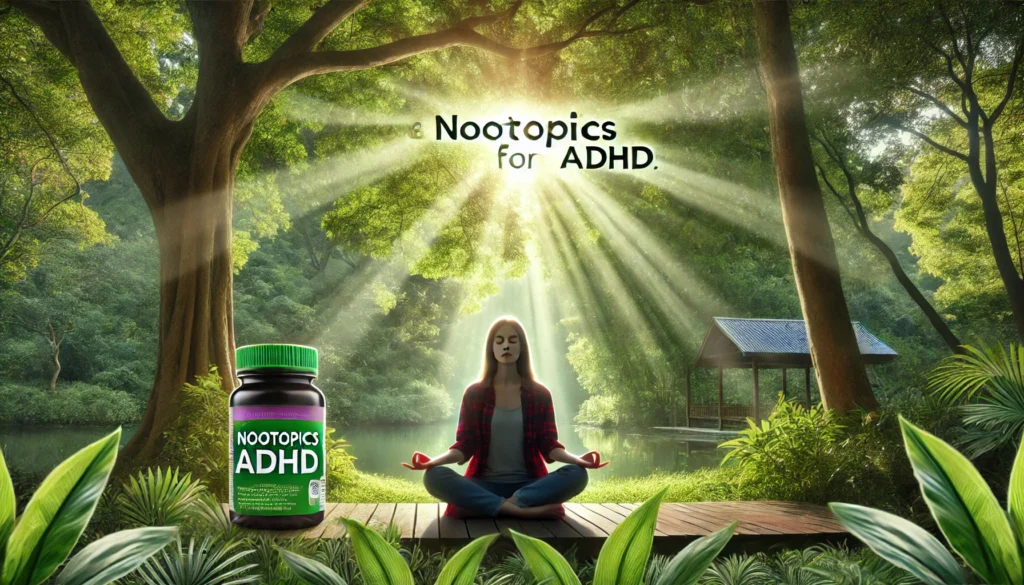Attention Deficit Hyperactivity Disorder (ADHD) is a common neurodevelopmental disorder. It affects both children and adults, causing symptoms like inattention, hyperactivity, and impulsivity.
Managing ADHD can be challenging. Traditional treatments often involve stimulant and non-stimulant medications. But these may not work for everyone and can have side effects.
Enter nootropics. These are substances that can enhance cognitive function. They’re gaining attention as potential aids for ADHD.
Nootropics may influence neurotransmitters involved in ADHD. They could potentially help manage symptoms and improve cognitive performance. But do they really work?
This guide explores the potential of nootropics for ADHD. It delves into scientific research, personal experiences, and practical considerations.
We’ll look at popular nootropics used for ADHD. We’ll discuss their potential benefits, safety considerations, and legal aspects.
We’ll also consider the role of lifestyle factors in managing ADHD. And how nootropics can fit into a holistic approach to health and wellness.
Whether you’re a health coach, a science journalist, or a biohacker, this guide aims to provide a comprehensive overview. It’s grounded in science, accessible, and practical. Let’s explore the world of nootropics for ADHD together.
You may also like: Top Memory Supplements to Combat Dementia
Understanding ADHD and Nootropics
ADHD, or Attention Deficit Hyperactivity Disorder, is characterized by a pattern of inattention and/or hyperactivity-impulsivity. This can impact educational, occupational, and social performance. Many individuals with ADHD experience difficulty staying focused, controlling behavior, and implementing tasks.
Treatment options traditionally include behavioral therapy and medications like methylphenidate and amphetamines. These medications primarily target neurotransmitter imbalances. However, not everyone responds to these treatments, and side effects can be a concern.
This has led some to explore alternative approaches, like nootropics. Nootropics are compounds that may enhance brain function. Users often seek improvements in focus, memory, and motivation. They’re sometimes called “smart drugs,” though this term can be misleading.
Nootropics for ADHD focus on cognitive enhancement. They aim to modulate neurotransmitter activity related to attention and impulse control. But the science behind their efficacy varies.
Common nootropics include Omega-3 fatty acids, L-Theanine, and Bacopa Monnieri. These have shown potential benefits for brain health and cognitive performance.
In exploring nootropics for ADHD, it’s important to consider personal responses. Factors such as biochemistry, lifestyle, and nutritional status all play a role.
What is ADHD?
ADHD affects millions worldwide, impacting both children and adults. It’s marked by symptoms like forgetfulness, disorganization, fidgeting, and impulsivity. These can lead to challenges in school, work, and everyday life.
The disorder is complex and involves multiple factors. Genetics, environmental influences, and brain structure can contribute to its development. It’s more prevalent in boys during childhood, though it affects adults of both sexes as well.
Symptoms often manifest in early childhood. They may persist into adulthood, although presentation can vary. Adults often experience different challenges, such as time management and maintaining employment.
The Role of Nootropics in Cognitive Enhancement
Nootropics are supplements or drugs that claim to improve cognitive function. They target various aspects of cognition, including memory, focus, and creativity. By enhancing neurotransmitter activity, they may boost brain performance.
Their popularity has surged in recent years, partly due to the biohacking movement. Biohackers use nootropics to optimize mental acuity and stamina, seeking an edge in cognitive functions.
For those with ADHD, the interest in nootropics stems from their potential to improve focus and reduce impulsivity. While traditional medications treat symptoms, nootropics may offer an alternative or complementary option.
Research is ongoing, exploring how nootropics can support ADHD management. They may work by enhancing neuroplasticity or regulating neurotransmitter levels. However, scientific consensus on their effectiveness varies, requiring further study.
Understanding how these substances interact with the brain is key. Individuals considering nootropics should proceed with informed caution, ideally under professional guidance.
Do Nootropics Help with ADHD?
The question of whether nootropics effectively help with ADHD is complex. While traditional medications focus on increasing specific neurotransmitters, nootropics aim to enhance overall brain function. This broader approach can be appealing to those seeking alternative or supplemental treatments.
Nootropics, unlike conventional stimulants, often provide subtler cognitive boosts. They’re used not just to reduce ADHD symptoms but also to improve general cognitive performance. This makes them popular among those who prefer a holistic perspective on mental health.
However, the effectiveness of nootropics in ADHD is not universally agreed upon. People’s responses can vary greatly, and more research is needed to establish clear benefits. Not every nootropic will work for everyone, as individuals’ neurochemistry can differ.
Consideration should be given to how nootropics affect neurotransmitter systems like dopamine and norepinephrine, key players in ADHD. Effective nootropics may work by modulating these neurotransmitters, leading to improved focus and reduced impulsivity.
Some nootropics show promise in supporting ADHD management by:
- Enhancing attention span.
- Reducing impulsive behavior.
- Boosting overall cognitive function.
- Providing added mental energy and focus.
It’s essential to have realistic expectations and to approach nootropic use cautiously, ideally with input from healthcare providers.

Scientific Evidence and Studies
Research into the use of nootropics for ADHD is still emerging, with varying results. While some studies suggest potential benefits, others highlight the need for more rigorous trials. This makes navigating the claims about nootropics challenging.
For instance, Omega-3 fatty acids have been studied for their role in brain health. Some research suggests they can reduce ADHD symptoms by improving neuronal function and reducing inflammation. However, the results can be inconsistent.
Another example is L-Theanine, known for its calming effects and ability to enhance focus and reduce anxiety. Some studies have indicated that it may help reduce stress-related ADHD symptoms. More controlled studies, however, are necessary for definitive conclusions.
Bacopa Monnieri is gaining attention for its potential memory-enhancing effects. Some research hints at improved cognitive performance and attention in ADHD populations. Yet, these findings call for further exploration to confirm efficacy and safety.
Overall, while some studies support the potential use of nootropics in managing ADHD symptoms, robust clinical trials are lacking. Future research needs to focus on long-term effects and understand how nootropics interact with traditional ADHD medications.
Personalized Nootropic Use and Biohacking
Personalized nootropic use is central to the biohacking philosophy. This approach emphasizes tailoring nootropic regimens to fit each individual’s unique neurochemistry and lifestyle. By doing so, users might better target specific cognitive deficits.
Biohackers experiment with various nootropics to optimize brain function. They often rely on self-monitoring techniques to track progress and fine-tune dosages. This personalized strategy can potentially help manage ADHD symptoms more effectively than a one-size-fits-all approach.
Popular Nootropic Supplements for ADHD
Nootropics for ADHD encompass a range of supplements targeting specific cognitive needs. They often offer benefits such as enhanced focus, mood regulation, and cognitive resilience. Understanding the function and effects of each nootropic can guide individuals in selecting the best options.
Certain nootropics are more widely recognized for their benefits in managing ADHD symptoms. These include Omega-3 fatty acids, L-Theanine, and Bacopa Monnieri, each offering unique advantages for brain health. Exploring their roles provides insight into how they may complement ADHD treatment.
Biohackers and wellness experts often experiment with these supplements. The goal is to find effective combinations that work best for individual needs. Below is an overview of some of the most popular nootropic supplements for ADHD management:
- Omega-3 Fatty Acids
- L-Theanine
- Bacopa Monnieri
It’s crucial to remember that responses to these supplements can vary. What works for one person might not for another. This makes consulting with healthcare professionals a wise practice when incorporating nootropics.
Omega-3 Fatty Acids
Omega-3 fatty acids are essential fats vital for brain health. They are found in fish oil and certain plant oils and have been linked to reducing ADHD symptoms. These fatty acids support brain cell communication and anti-inflammatory processes.
Several studies suggest Omega-3s improve concentration and cognitive function in those with ADHD. They may help balance mood and reduce hyperactivity. Regular intake of Omega-3s contributes to overall neuronal health and cognitive stability.
L-Theanine
L-Theanine, an amino acid found in tea leaves, is notable for its calming properties. It enhances alpha brain waves, which foster relaxation without sedation. This makes it appealing for individuals with ADHD seeking improved focus.
Many users report that L-Theanine alleviates stress and anxiety. This can lead to better mental clarity and reduced distractibility. It may work synergistically with caffeine to improve focus and alertness while mitigating jitters.
Bacopa Monnieri
Bacopa Monnieri is a traditional herb used in Ayurvedic medicine. Known for its cognitive-enhancing properties, it supports memory and learning. It can increase the production of certain neurotransmitters, improving synaptic communication.
Research indicates that Bacopa Monnieri may enhance attention and memory retention. This makes it beneficial for managing cognitive deficits linked to ADHD. Regular use of Bacopa may bolster mental performance and support long-term brain health.
Other Notable Nootropics
Beyond these, several other nootropics show promise in ADHD management. Notable options include:
- Rhodiola Rosea: Reduces fatigue, enhances stamina.
- Ginkgo Biloba: Improves circulation and cognitive function.
- Alpha GPC: Supports neurotransmitter synthesis and brain health.
These supplements can complement traditional treatments and offer holistic benefits. Their diverse mechanisms of action provide various ways to support cognitive wellness. When used thoughtfully, they can enhance the effectiveness of ADHD management strategies.
Safety, Side Effects, and Legal Considerations
Nootropics are generally considered safe when used responsibly. However, potential side effects and interactions should be noted. Understanding these factors is essential for a balanced approach to ADHD management.
Some individuals may experience mild side effects from nootropics. Common issues can include headaches, nausea, or digestive discomfort. It’s crucial to start with lower doses to gauge individual tolerance.
Interactions between nootropics and medications are possible. They may alter drug effectiveness or cause unforeseen reactions. Consulting healthcare providers before combining supplements with medications is advised.
Here are key safety considerations to keep in mind:
- Start with a low dose and observe effects.
- Monitor for any adverse reactions or changes in well-being.
- Avoid mixing nootropics with prescription drugs without professional guidance.
Informed use of nootropics includes recognizing both benefits and potential risks. Proper research and consultation can optimize safety and effectiveness.

Potential Side Effects and Interactions
Side effects of nootropics can vary based on individual factors and dosages. Some might experience increased heart rate or restlessness with stimulatory compounds. Conversely, calming nootropics could lead to drowsiness if taken in high doses.
Various nootropics can interact with each other or other medications. This could amplify effects or lead to unexpected outcomes. A thorough examination of each nootropic’s action is necessary.
It’s important to track how your body responds to each supplement. Keeping a journal can assist in identifying patterns and ensuring safe use. Professional advice from healthcare providers remains a cornerstone of responsible nootropic use.
Legal and Ethical Aspects of Nootropic Use
The legal status of nootropics varies globally. Some countries regulate them strictly, while others treat them as dietary supplements. Being aware of local regulations ensures compliance and avoids legal issues.
Ethically, responsible use involves transparency and informed consent. Sharing information about nootropics with peers or clients should include potential risks. Encouraging ongoing dialogue and education fosters responsible and ethical use.
Advocating for high-quality research and manufacturing standards is also crucial. This ensures consumers receive safe and effective nootropic products. Encouraging responsible sourcing practices supports both individuals and the wider community.
Lifestyle Factors and Holistic ADHD Management
In managing ADHD, lifestyle factors play a vital role. A comprehensive approach goes beyond supplements, focusing on overall well-being. Integrating nootropics with lifestyle adjustments maximizes benefits.
Diet, exercise, and sleep are foundational elements. They influence cognitive function and ADHD symptoms. A balanced lifestyle can complement nootropic use and optimize mental performance.
Creating a personalized plan involves assessing individual needs. Lifestyle habits should align with personal goals and preferences. This ensures adherence and effectiveness in ADHD management.
Here are some key lifestyle components to consider:
- Prioritize balanced nutrition and hydration.
- Engage in regular physical activity suited to your abilities.
- Establish a consistent sleep schedule to support brain health.
- Implement stress-reduction techniques, such as mindfulness or yoga.
A multi-faceted approach acknowledges the complexity of ADHD. It empowers individuals to manage their condition holistically. This integration of lifestyle changes and nootropic use can lead to significant improvements.
Staying informed about the effects of lifestyle choices is crucial. Knowledge enables individuals to make informed decisions and adjust as necessary. This proactive strategy fosters long-term well-being.
Diet and Nutrition
Nutrition impacts brain function, influencing ADHD symptoms. A diet rich in whole foods supports cognitive health. Essential nutrients like Omega-3 fatty acids promote neurotransmitter balance.
Processed foods and high sugar intake can exacerbate ADHD. Reducing these can improve focus and behavior. Prioritizing fruits, vegetables, lean proteins, and whole grains is beneficial.
Staying hydrated enhances cognitive performance. Dehydration may worsen inattention and distractibility. Drinking sufficient water each day supports optimal brain function.
Exercise and Physical Activity
Regular exercise benefits ADHD management. It boosts endorphin levels and reduces symptoms like hyperactivity. Physical activity can improve mood and concentration.
Exercise routines should align with individual preferences. Activities like swimming, cycling, or yoga can be both enjoyable and effective. Consistency is key to realizing cognitive benefits.
Exercise also encourages better sleep patterns. Physical activity promotes relaxation, aiding in stress reduction. This contributes to a holistic ADHD management strategy.
Sleep and Stress Management
Sleep quality directly affects ADHD symptoms. Inadequate rest can impair focus and heighten impulsivity. Establishing a regular sleep schedule optimizes cognitive function.
Creating a relaxing evening routine supports restful sleep. Techniques like meditation or reading before bed can promote relaxation. These habits can enhance overall well-being.
Stress management is another crucial aspect. Chronic stress exacerbates ADHD symptoms. Engaging in stress-relief practices is essential for balanced mental health. Mindfulness, deep breathing, or yoga can alleviate stress effectively.
Nootropics Stacking and Personalized Regimens
Nootropic stacking involves combining multiple substances for enhanced effects. This approach targets specific cognitive functions. For ADHD, the right stack may improve focus and reduce impulsivity.
Personalizing a nootropic regimen requires understanding individual needs. Each person responds differently to nootropics. Fine-tuning the stack based on personal experiences and goals enhances its effectiveness.
Common components in ADHD nootropic stacks include:
- Omega-3 fatty acids for brain health.
- L-Theanine for calming and focus.
- Bacopa Monnieri to boost memory and attention.
- Caffeine for a quick energy and alertness boost.
The synergy between substances is key. Thoughtful combinations can amplify benefits. However, it’s vital to be cautious about potential interactions.
Tracking progress helps refine the stack. Observing changes in symptoms informs adjustments. This iterative process tailors the regimen to best fit the user’s needs.
Creating a Nootropic Stack for ADHD
Designing a nootropic stack begins with research. Understanding each component’s effects aids in making informed choices. It’s essential to choose substances with complementary actions.
Start simple and build complexity gradually. Begin with one or two core nootropics. Monitor responses before adding additional elements.
Flexibility is crucial. Adjustments based on experiences refine the stack. This dynamic approach ensures it remains effective over time.
Consulting Healthcare Professionals
Consulting healthcare professionals is paramount when using nootropics. They provide valuable insights into safety and efficacy. Their expertise guides informed decision-making.
Professionals help identify potential interactions with medications. They also tailor recommendations to specific health needs. This personalized guidance supports safer and more effective nootropic use.
Open communication with healthcare providers ensures comprehensive care. Sharing goals and experiences with them enhances collaboration. This partnership is key to optimizing ADHD management strategies.
Conclusion and Future Directions
Nootropics offer promising support for individuals with ADHD. They complement traditional treatments and lifestyle changes. As interest grows, so does the need for robust research.
Future studies will likely enhance our understanding of nootropics. Evidence-based insights can drive better practices. Personalized approaches tailored to individual responses will become increasingly important.
The Evolving Landscape of Nootropics and ADHD
New discoveries in nootropics continue to shape ADHD management. Innovative formulations and comprehensive studies reveal more about their potential. Staying attuned to these developments enriches our knowledge base.

Staying Informed and Responsible Use
Remaining informed ensures safe and effective nootropic use. Engage with up-to-date research and expert advice. Responsible consumption and consulting with professionals strengthen ADHD management strategies.
Further Reading
ADF: What are nootropics?
Inflow: Can nootropics really treat ADHD symptoms? If so, how?
NIH: Non-Pharmacological Treatments for ADHD in Youth
Important Note: The information contained in this article is for general informational purposes only, and should not be construed as health or medical advice, nor is it intended to diagnose, prevent, treat, or cure any disease or health condition. Before embarking on any diet, fitness regimen, or program of nutritional supplementation, it is advisable to consult your healthcare professional in order to determine its safety and probable efficacy in terms of your individual state of health.
Regarding Nutritional Supplements Or Other Non-Prescription Health Products: If any nutritional supplements or other non-prescription health products are mentioned in the foregoing article, any claims or statements made about them have not been evaluated by the U.S. Food and Drug Administration, and such nutritional supplements or other health products are not intended to diagnose, treat, cure, or prevent any disease.


